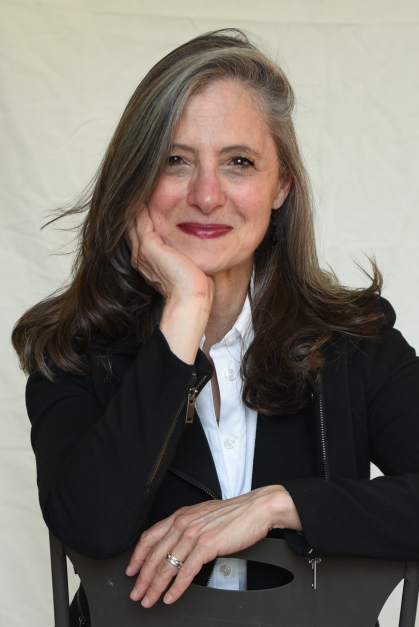Professor Recognized for Book on Pioneer in Holocaust Studies
Nancy Sinkoff recently won a National Jewish Book Award for her biography of Lucy S. Dawidowicz

Nancy Sinkoff, a professor of Jewish studies and history at Rutgers University–New Brunswick, has dedicated her research to bringing the life of Lucy S. Dawidowicz back into the public eye.
Dawidowicz, a trailblazing historian in the field now known as Holocaust studies, was a controversial figure who argued that Adolf Hitler’s plan to exterminate the Jewish people didn’t evolve over time, but instead was his intended goal before he even rose to power, and that German support for Hitler was driven by antisemitism that existed for centuries. Bookended by WWI and the end of Soviet Communism, Sinkoff presents Dawidowicz’s story as a window into 20th-century Jewish life.
Sinkoff, academic director of the Allen and Joan Bildner Center for the Study of Jewish Life at Rutgers, recently won the National Jewish Book Award in the category of biography for her book From Left to Right: Lucy S. Dawidowicz, the New York Intellectuals, and the Politics of Jewish History (Wayne State University Press, 2020), which is the first comprehensive biography of Dawidowicz. The book was also named a Natan Notable Book by the Natan Fund and Jewish Book Council in fall 2020.
She talked to us about her research and why Dawidowicz’s story is still relevant.
Can you tell us about Lucy S. Dawidowicz and who she was?
Lucy S. Dawidowicz (1915–1990) was an East European Jewish immigrant daughter and a pioneer historian in the field that is now called Holocaust studies. Dawidowicz was a household name in the postwar years, not only because of her scholarship but also due to her political views. Like many other Jewish immigrant children, Dawidowicz became engaged with leftist politics in the interwar years, moved to embrace FDR’s Democratic Party in the 1930s and 1940s, and – chastened by the social and political upheavals of the 1960s – moved to the right politically. In the 1970s and 1980s, she championed neoconservatism and support for Ronald Reagan’s presidency. At the same time, she was writing accessible books on East European Jewish history and the Holocaust.
How did you get interested in her story and what is the significance of her contribution?
I first encountered Dawidowicz when I read From that Place and Time, 1938–1947: A Memoir (1989), which detailed her European experiences. That book is a reflection on the secular Yiddish culture that nurtured Dawidowicz and propelled her to Vilna, Poland, in 1938, before the destruction of European Jewry, and back to occupied Germany in the postwar years, after the Holocaust. At the time I was in graduate school, focusing on the Jewish Enlightenment in Poland and I was trying to understand how the Jews of Eastern Europe made intellectual and cultural sense of the modern world. An abiding feature of their encounter with modernity was the commitment to Yiddish. I was intrigued that almost a century and a half later Dawidowicz was also grappling with the legacy of Yiddish culture in the American diaspora.
Dawidowicz is best known for her seminal work, The War Against the Jews, 1933–1945 (1975), which outlined her view of the “intentionalism” of Hitler’s antisemitism that she believed led to the “Final Solution.” Even more important was her book’s second half, which analyzed the ways in which East European Jews responded to the German assault with agency and dignity—despite their grievous suffering — which marked a new perspective on the victimization and alleged powerlessness of European Jewry drawn from Jewish sources.
Why is it timely and important to tell her story now? How does it reflect on our times?
As I researched Dawidowicz’s life, I found that she had a preternatural way of putting her finger on the fundamental dilemmas of modern Jewish life, such as the causes of the Final Solution, the tensions between the singularity and universality of the Holocaust; the relationship of Jews to modern political liberalism; the viability of secular Jewish culture; the sanctity of the absolute separation of church and state; the role of Jews in political and social movements, such as civil rights, feminism, and Jewish religious renewal; and the legitimacy of American Jewish dissent on Israeli politics. These issues are still very alive.
With women’s history month coming to an end and Holocaust Day of Remembrance approaching April 8, what message are you hoping people will take away from Dawidowicz’s story and your research?
First, I want people to take her seriously and not to prejudge her because of her politics, her criticism of feminism, or her views on the origins of the Final Solution. Second, I hope my book proves that Jewish politics are not static; they evolve and change. Dawidowicz’s turn to the right was, therefore, not a betrayal of Jewish values. It was a specific, postwar American expression of her Jewish values. Third, I agree with Dawidowicz that the fundamental “story” of the Holocaust is, tragically, the success of “The War Against the Jews.” Despite the rebirth of Jewish life in certain parts of Europe, the main stages of Jewish life today are in Israel and in the United States. The loss of the civilization of East European Jewry cannot be overstated; it haunts the Jewish present. Fourth, we should always pay attention to smart, tough, brave, stubborn, clear-writing and clear-thinking women. Even if we find ourselves in disagreement with them, they have something to teach us.